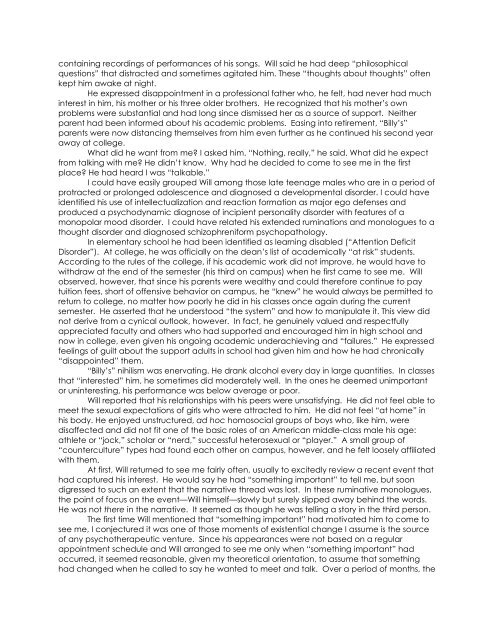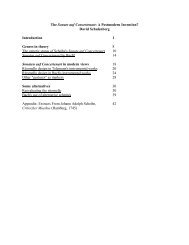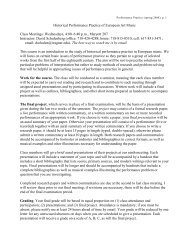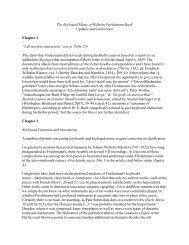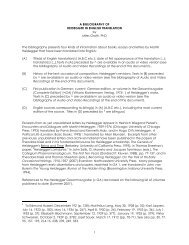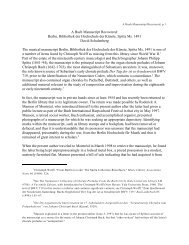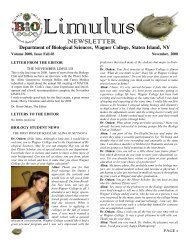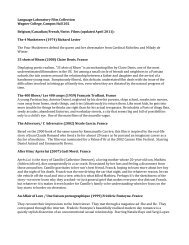SEVEN PAPERS ON EXISTENTIAL ANALYSIS ... - Wagner College
SEVEN PAPERS ON EXISTENTIAL ANALYSIS ... - Wagner College
SEVEN PAPERS ON EXISTENTIAL ANALYSIS ... - Wagner College
Create successful ePaper yourself
Turn your PDF publications into a flip-book with our unique Google optimized e-Paper software.
containing recordings of performances of his songs. Will said he had deep “philosophical<br />
questions” that distracted and sometimes agitated him. These “thoughts about thoughts” often<br />
kept him awake at night.<br />
He expressed disappointment in a professional father who, he felt, had never had much<br />
interest in him, his mother or his three older brothers. He recognized that his mother’s own<br />
problems were substantial and had long since dismissed her as a source of support. Neither<br />
parent had been informed about his academic problems. Easing into retirement, “Billy’s”<br />
parents were now distancing themselves from him even further as he continued his second year<br />
away at college.<br />
What did he want from me? I asked him. “Nothing, really,” he said. What did he expect<br />
from talking with me? He didn’t know. Why had he decided to come to see me in the first<br />
place? He had heard I was “talkable.”<br />
I could have easily grouped Will among those late teenage males who are in a period of<br />
protracted or prolonged adolescence and diagnosed a developmental disorder. I could have<br />
identified his use of intellectualization and reaction formation as major ego defenses and<br />
produced a psychodynamic diagnose of incipient personality disorder with features of a<br />
monopolar mood disorder. I could have related his extended ruminations and monologues to a<br />
thought disorder and diagnosed schizophreniform psychopathology.<br />
In elementary school he had been identified as learning disabled (“Attention Deficit<br />
Disorder”). At college, he was officially on the dean’s list of academically “at risk” students.<br />
According to the rules of the college, if his academic work did not improve, he would have to<br />
withdraw at the end of the semester (his third on campus) when he first came to see me. Will<br />
observed, however, that since his parents were wealthy and could therefore continue to pay<br />
tuition fees, short of offensive behavior on campus, he “knew” he would always be permitted to<br />
return to college, no matter how poorly he did in his classes once again during the current<br />
semester. He asserted that he understood “the system” and how to manipulate it. This view did<br />
not derive from a cynical outlook, however. In fact, he genuinely valued and respectfully<br />
appreciated faculty and others who had supported and encouraged him in high school and<br />
now in college, even given his ongoing academic underachieving and “failures.” He expressed<br />
feelings of guilt about the support adults in school had given him and how he had chronically<br />
“disappointed” them.<br />
“Billy’s” nihilism was enervating. He drank alcohol every day in large quantities. In classes<br />
that “interested” him, he sometimes did moderately well. In the ones he deemed unimportant<br />
or uninteresting, his performance was below average or poor.<br />
Will reported that his relationships with his peers were unsatisfying. He did not feel able to<br />
meet the sexual expectations of girls who were attracted to him. He did not feel “at home” in<br />
his body. He enjoyed unstructured, ad hoc homosocial groups of boys who, like him, were<br />
disaffected and did not fit one of the basic roles of an American middle-class male his age:<br />
athlete or “jock,” scholar or “nerd,” successful heterosexual or “player.” A small group of<br />
“counterculture” types had found each other on campus, however, and he felt loosely affiliated<br />
with them.<br />
At first, Will returned to see me fairly often, usually to excitedly review a recent event that<br />
had captured his interest. He would say he had “something important” to tell me, but soon<br />
digressed to such an extent that the narrative thread was lost. In these ruminative monologues,<br />
the point of focus on the event—Will himself—slowly but surely slipped away behind the words.<br />
He was not there in the narrative. It seemed as though he was telling a story in the third person.<br />
The first time Will mentioned that “something important” had motivated him to come to<br />
see me, I conjectured it was one of those moments of existential change I assume is the source<br />
of any psychotherapeutic venture. Since his appearances were not based on a regular<br />
appointment schedule and Will arranged to see me only when “something important” had<br />
occurred, it seemed reasonable, given my theoretical orientation, to assume that something<br />
had changed when he called to say he wanted to meet and talk. Over a period of months, the


